Bread making is a wholesome and rewarding culinary skill that everyone can learn. The process of transforming simple ingredients like flour, water, yeast, and salt into a crusty loaf of bread can be magical. This blog, “Making Bread at Home: The Basics of Homemade Bread,” will take you on a journey, unraveling the art and science behind bread baking. From understanding the roles of different ingredients to mastering essential techniques like kneading and proofing, you’ll discover the joy and satisfaction that comes from making bread at home. By the end, you’ll be well-equipped to bake bread at home and experience the wonderful aroma of a freshly-baked loaf wafting from your oven.
Understanding the Role of Ingredients in Bread Making
When baking bread, each ingredient serves a vital purpose, contributing to the texture, taste, and structure of the final loaf.
The Science Behind Flour: Flour is the backbone of bread, providing the necessary proteins, namely gluten, which give bread its structure. Gluten strands trap carbon dioxide released by the yeast, causing the dough to rise.
The Magic of Yeast: Yeast, a key player in bread making, is a type of fungus. It ferments the sugars in the dough, producing carbon dioxide gas and alcohol. This process, known as fermentation, is what causes the bread to rise and imparts a distinctive flavor.
The Importance of Salt and Water: Salt tightens the gluten structure, adding strength and preventing the dough from collapsing, while also enhancing flavor. Water activates the yeast and helps form the gluten structure. It also plays a crucial role in the baking process, as the steam generated helps create a crispy crust.
Understanding the role of these ingredients can truly elevate your bread baking, allowing you to create loaves with great texture, flavor, and appearance.
The Different Types of Bread
Bread, a staple in many diets around the world, comes in countless varieties, each with unique characteristics based on the ingredients used and the baking methods employed.
- White Bread: Made from refined wheat flour, it’s light, soft, and perfect for sandwiches.
- Whole Wheat Bread: This hearty bread uses the whole grain, retaining more nutrients and fiber than white bread.
- Sourdough: A tangy loaf made with a ‘starter’ that ferments over time, giving it a distinct flavor and texture.
- Rye Bread: Made partially or wholly from rye flour, it’s dense and has a slightly sour taste.
- Baguette: A long, thin French bread with a distinctive crispy crust and soft interior.
- Focaccia: An Italian flatbread, often topped with herbs and olives.
- Pita: A soft, round flatbread from the Middle East that puffs up when baked, creating a pocket inside.
Understanding different types of bread can enhance your baking journey, allowing you to experiment with various styles, tastes, and textures.
Understanding Bread Making Techniques
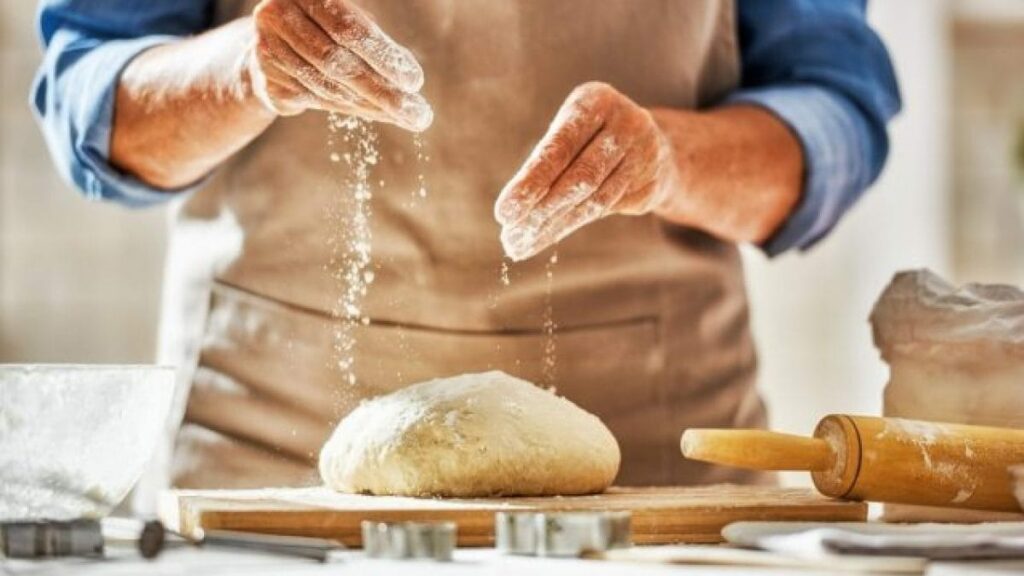
Bread making is a blend of art and science that involves a few fundamental techniques which are crucial to achieving that perfect loaf.
The Process of Kneading: Kneading develops the gluten in the flour, creating an elastic dough. This step is essential as it traps the carbon dioxide produced by the yeast, allowing the bread to rise and giving it a light and airy texture.
The Art of Proofing: Also known as rising, proofing is the time when the dough is allowed to rest and rise. During this stage, the yeast ferments the sugar in the dough, creating carbon dioxide which makes the dough expand. This results in a loaf that’s soft and fluffy on the inside.
Baking: Temperature and Time: Different breads require different baking temperatures and times. The right balance ensures a perfectly baked loaf: a golden, crispy crust encasing a soft, warm interior.
. Recipe 1: Basic White Bread

Making your first loaf of bread can be an exciting journey! Here’s a simple recipe for a basic white bread.
Ingredients:
1 packet (about 2 teaspoons) active dry yeast, 1 cup warm water, 2 tablespoons sugar, 1 teaspoon salt, 2 tablespoons vegetable oil, 3 cups all-purpose flour.
- Activate the Yeast: Dissolve the sugar in warm water and sprinkle yeast on top. Let it sit for 10 minutes until it becomes frothy.
- Make the Dough: In a large bowl, combine salt, oil, and 2 cups of flour. Add the yeast mixture and stir. Gradually add the remaining flour until a dough forms.
- Knead: On a floured surface, knead the dough for about 10 minutes until it’s smooth and elastic.
- First Proof: Place dough in a greased bowl, cover, and let it rise in a warm place for 1-2 hours until it doubles in size.
- Shape and Second Proof: Punch down the dough, shape it into a loaf, and place it in a greased loaf pan. Let it rise for about 30-45 minutes.
- Bake: Preheat your oven to 375°F (190°C). Bake for 30-35 minutes or until golden brown. Cool before slicing.
Enjoy the fresh, warm slices of your homemade white bread! It’s a great starting point in your bread-baking journey.
. Recipe 2: Whole Wheat Bread
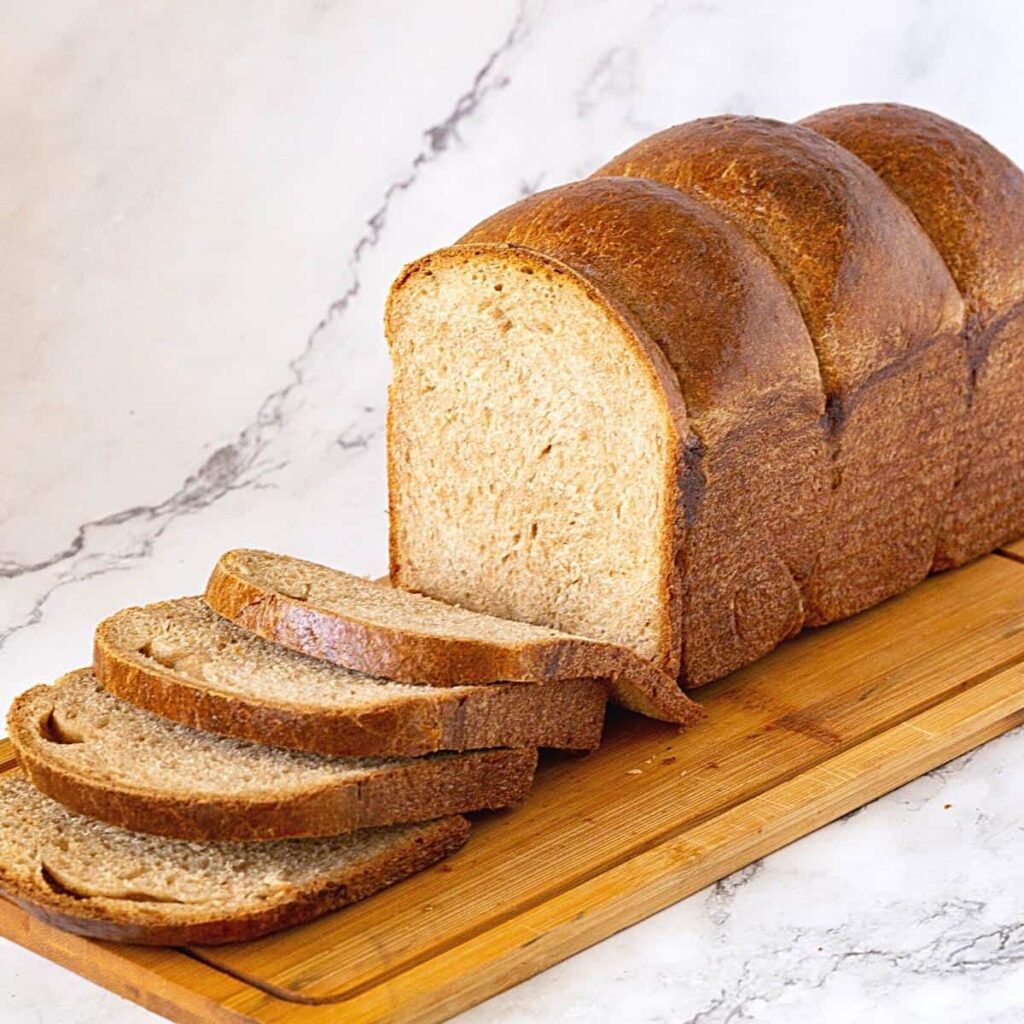
Whole wheat bread is a flavorful and healthy alternative to white bread. Here’s a simple type of bread recipe to guide you in baking your first loaf.
Ingredients:
1 packet (about 2 teaspoons) active dry yeast, 2 cups warm water, 1/3 cup honey, 1/3 cup vegetable oil, 1 tablespoon salt, 5-6 cups whole wheat flour.
- Activate the Yeast: Dissolve the honey in warm water and sprinkle yeast on top. Let it sit for 10 minutes until it becomes frothy.
- Make the Dough: In a large bowl, combine oil, salt, and 3 cups of flour. Add the yeast mixture and stir. Gradually add the remaining flour until a dough forms.
- Knead: On a floured surface, knead the dough for about 10-15 minutes until it’s smooth and elastic.
- First Proof: Place dough in a greased bowl, cover, and let it rise in a warm place for 1-2 hours until it doubles in size.
- Shape and Second Proof: Punch down the dough, shape it into a loaf, and place it in a greased loaf pan. Let it rise for about 30-45 minutes.
- Bake: Preheat your oven to 375°F (190°C). Bake for 40-45 minutes or until golden brown. Cool before slicing.
Savor the natural sweetness and hearty texture of your homemade whole wheat bread. It’s a delicious and nutritious addition to your bread-baking repertoire.
. Recipe 3: Baguette

A French classic, the Baguette, is known for its crusty exterior and soft, airy interior. Here’s how to make Baguette Bread at home.
Ingredients:
1 packet (about 2 teaspoons) active dry yeast, 1 1/2 cups warm water, 2 teaspoons sugar, 1 1/2 teaspoons salt, 3 1/2 cups bread flour.
- Activate the Yeast: Dissolve the sugar in warm water and sprinkle yeast on top. Let it sit for 10 minutes until it becomes frothy.
- Make the Dough: Combine the yeast mixture, salt, and flour in a large bowl and knead until the dough is smooth and elastic, about 10 minutes.
- First Proof: Place the dough in a greased bowl, cover, and let it rise for about 1 hour or until doubled in size.
- Shape and Second Proof: Divide the dough into two and shape each piece into a long, thin loaf (baguette shape). Let it rise for about 30 minutes.
- Bake: Preheat your oven to 450°F (230°C). Create steam by placing a pan of water at the bottom of the oven. Bake the baguettes for about 20-25 minutes until they are golden brown and sound hollow when tapped.
Enjoy your homemade baguettes with butter or your homemade dip. The crusty exterior and soft interior are a delight for all bread lovers.
. Recipe 4: Simple Sourdough Bread
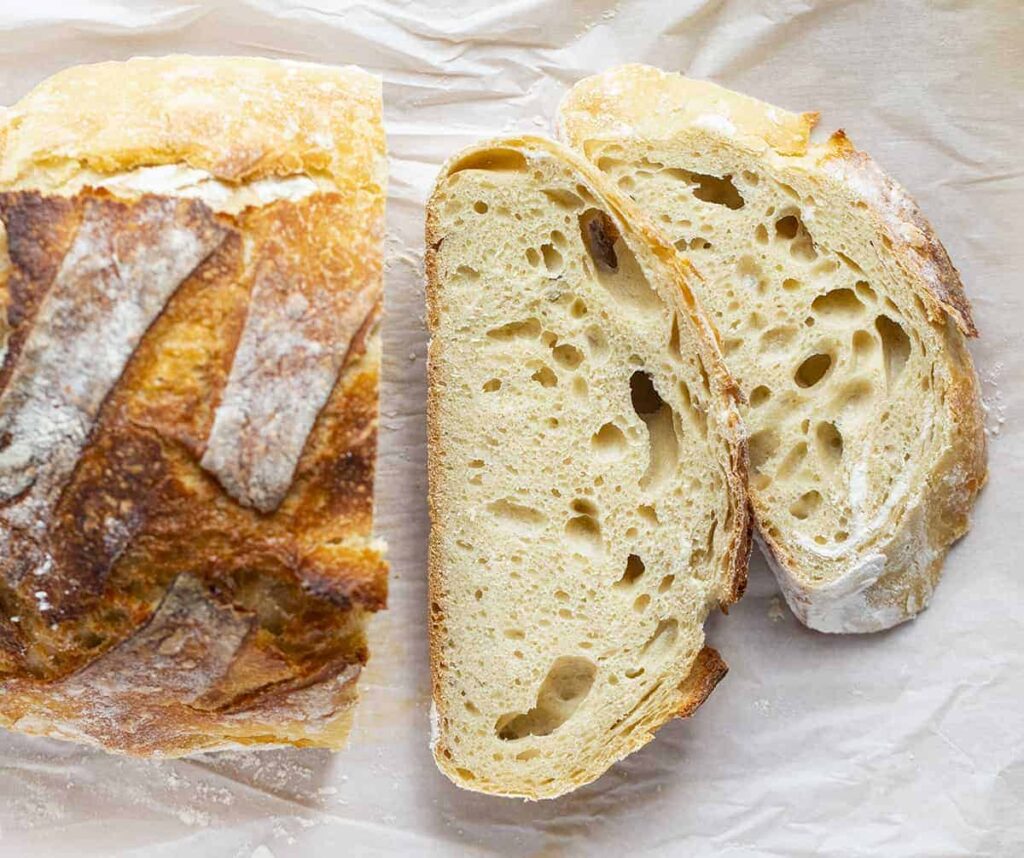
Sourdough bread, with its characteristic tangy flavor, is a bread lover’s delight. Here’s a basic recipe for a homemade sourdough loaf.
Ingredients:
1 cup sourdough starter, 1 1/2 cups warm water, 2 teaspoons salt, 5 cups bread flour.
- Prepare the Dough: In a large bowl, mix the sourdough starter with warm water, then add the salt and flour. Stir until it forms a sticky dough.
- Knead: On a floured surface, knead the dough for about 10 minutes until it becomes smooth and elastic.
- First Proof: Cover the dough and let it rise at room temperature for 3-4 hours or until doubled in size.
- Shape and Second Proof: Shape the dough into a loaf, place it on a baking sheet dusted with flour, and cover it. Let it rise for about 2 hours.
- Bake: Preheat your oven to 450°F (230°C). Make a few slashes on the top of the loaf with a sharp knife. Bake for 30-35 minutes or until golden brown and the loaf sounds hollow when tapped.
Enjoy the distinct flavor of your homemade sourdough bread. Its tangy taste and chewy texture make it a favorite in many households!
Related: Fun and Healthy Snack Ideas for kids.
. Recipe 5: Rosemary Garlic Bread

Rosemary Garlic Bread is a delectable twist on the classic loaf, filled with aromatic herbs and a hint of garlic. Here’s how to bake this flavorful bread at home.
Ingredients:
1 packet (about 2 teaspoons) active dry yeast, 1 1/4 cups warm water, 2 teaspoons sugar, 1 1/2 teaspoons salt, 2 tablespoons olive oil, 3 1/2 cups bread flour, 2 tablespoons chopped fresh rosemary, 2 cloves minced garlic.
- Activate the Yeast: Dissolve the sugar in warm water and sprinkle yeast on top. Let it sit for 10 minutes until it becomes frothy.
- Make the Dough: In a large bowl, combine flour, salt, olive oil, rosemary, garlic, and the yeast mixture. Stir until a dough forms.
- Knead: On a floured surface, knead the dough for about 10 minutes until it’s smooth and elastic.
- First Proof: Place dough in a greased bowl, cover, and let it rise in a warm place for 1-2 hours until it doubles in size.
- Shape and Second Proof: Shape the dough into a loaf and place it on a baking sheet. Let it rise for about 45 minutes.
- Bake: Preheat your oven to 375°F (190°C). Bake for 35-40 minutes or until golden brown. Cool before slicing.
Enjoy the aromatic and delicious slices of your homemade Rosemary Garlic Bread. It’s perfect for sandwiches or to accompany your favorite pasta dish. Happy baking!
. Recipe 6: Focaccia
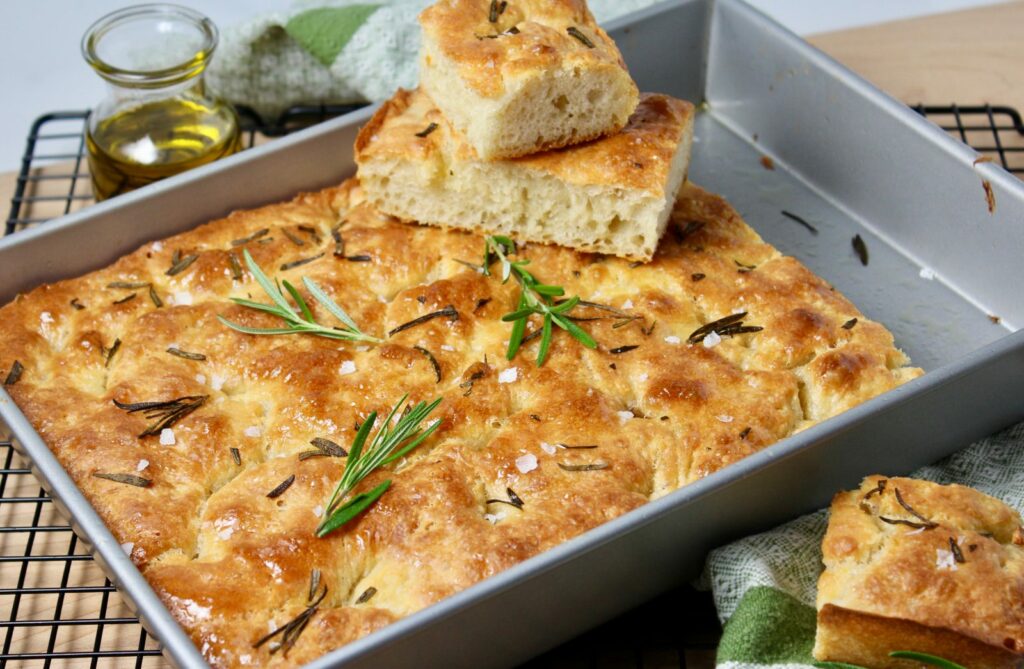
Focaccia, an Italian flatbread, is rich with olive oil and can be topped with a variety of flavors. Here’s how to make Focaccia bread at home.
Ingredients:
1 packet (about 2 teaspoons) active dry yeast, 1 cup warm water, 2 tablespoons sugar, 1/2 cup olive oil, 2 teaspoons salt, 2 1/2 cups all-purpose flour, Coarse sea salt, and rosemary for topping.
- Activate the Yeast: Dissolve the sugar in warm water and sprinkle yeast on top. Let it sit for 10 minutes until it becomes frothy.
- Make the Dough: In a large bowl, combine flour, salt, 1/4 cup olive oil, and the yeast mixture. Stir until a dough forms.
- First Proof: Cover the dough and let it rise for 1 hour, or until doubled in size.
- Shape and Second Proof: Flatten the dough onto an oiled baking sheet, cover, and let it rise for another hour.
- Prep and Bake: Preheat your oven to 400°F (200°C). Poke dimples into the dough using your fingers, drizzle the remaining oil, and sprinkle sea salt and rosemary. Bake for 20-25 minutes until golden brown.
Enjoy your homemade focaccia as a side or make it into a flavorful sandwich. This versatile bread is sure to be a hit!
. Recipe 7: Soft Pretzels
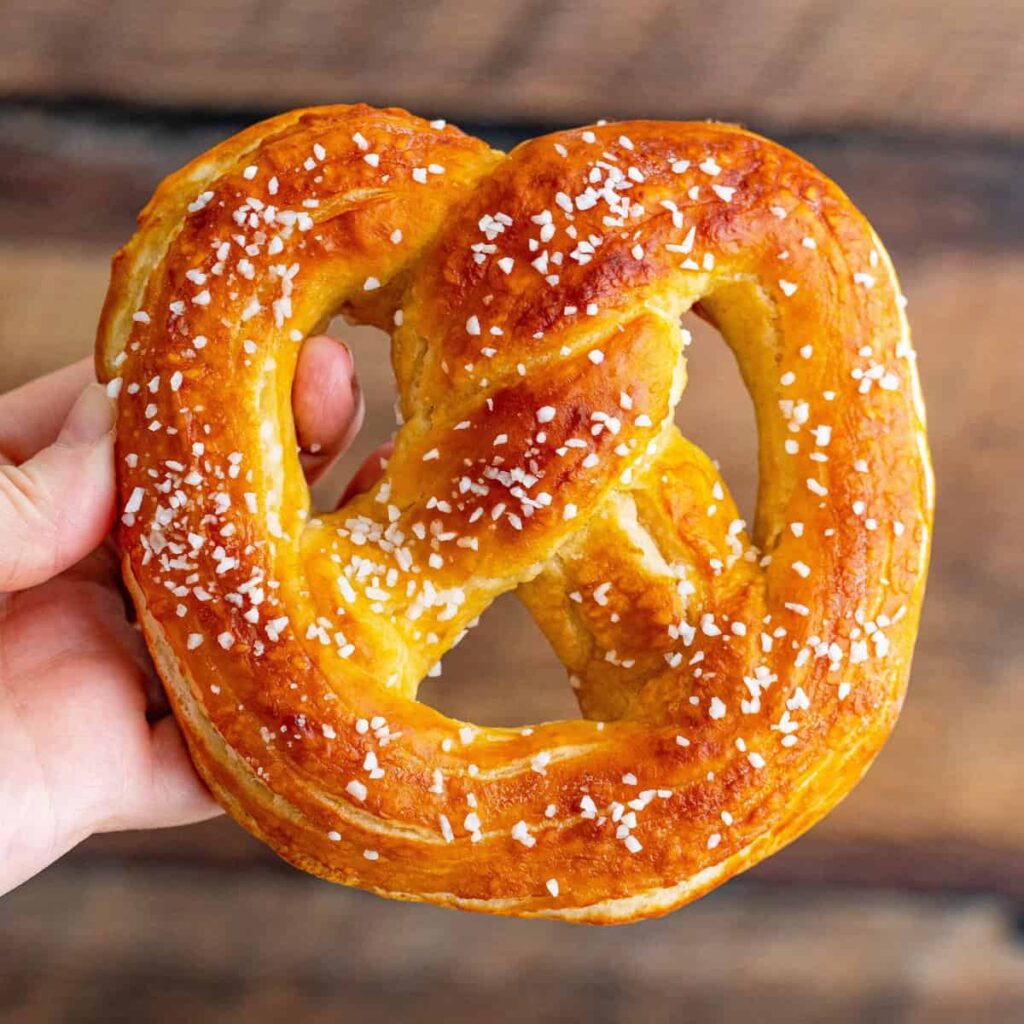
Soft pretzels, with their chewy texture and distinctive flavor, are a fun and satisfying snack. Here’s how you can make them at home.
Ingredients:
1 packet (about 2 teaspoons) active dry yeast, 1 1/2 cups warm water, 1 teaspoon salt, 1 tablespoon sugar, 4 cups all-purpose flour, coarse sea salt for topping, 1/2 cup baking soda (for boiling water bath).
- Activate the Yeast: Dissolve sugar in warm water and sprinkle yeast on top. Let it sit for 10 minutes until frothy.
- Make the Dough: Mix flour and salt in a large bowl. Add yeast mixture and knead until dough is smooth and elastic, about 10 minutes.
- First Proof: Cover dough and let it rise for 1 hour or until doubled in size.
- Shape: Divide dough into 12 pieces and roll each into a long rope. Twist into a pretzel shape.
- Boil: Preheat your oven to 450°F (230°C). Dissolve baking soda in a large pot of boiling water. Boil each pretzel for 30 seconds, then place on a baking sheet.
- Bake: Sprinkle pretzels with coarse sea salt, then bake for 12-15 minutes until golden brown.
Enjoy these soft pretzels warm for a delightful homemade snack. Experiment with different toppings like sesame seeds, poppy seeds, or even cinnamon sugar for a sweet twist!
Conclusion
Bread making is indeed a rewarding journey. The process of turning simple ingredients into delicious loaves is as fascinating as it is delightful. As you’ve learned in this guide, with a little patience, practice, and understanding of the basics, you can easily bake a variety of breads at home. Whether it’s a classic white bread, a hearty whole wheat loaf, or a fun soft pretzel, each bake adds to your experience and skill. So, embrace the process, be creative, and most importantly, enjoy every bite of your homemade bread.


